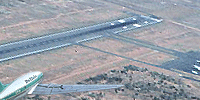 |
 |
|
||||
|
By
Wikipedia,
Sky lanterns (sky candles) (simplified Chinese: 天灯; traditional Chinese: 天燈; pinyin: tiān dēng or simplified Chinese: 孔明灯; traditional Chinese: 孔明燈; pinyin: kǒngmíng dēng) are airborne paper lanterns traditionally found in East Asian cultures. They are constructed from oiled rice paper on a bamboo frame, and contain a small candle or fuel cell composed of a waxy flammable material. When lit, the flame heats the air inside the lantern, thus lowering its density causing the lantern to rise into the air. The Sky Lantern is only airborne for as long as the flame stays alight, after which the lantern floats back to the ground. They can achieve quite a height and launching them in strong winds is not recommended. Sky lanterns are also referred to as sky candles or fire balloons, however this term is also used to refer to balloon munitions used during World War II. History
According to popular lore, the Kongming Lantern (Chinese: 孔明灯) was the first hot air balloon, said to be invented by the sage and military strategist Zhuge Liang, whose reverent term of address (i.e. Chinese style name) was Kongming. They were first deployed at the turn of the 3rd century as a type of signalling balloon or, it is claimed, as a type of spy blimp in warfare. Alternately the name may come from the lantern's resemblance to the hat Kongming is traditionally shown to be wearing. It is likely that this technological discovery is misattributed because of the Chinese historical practice of attributing great discoveries to significant historical figures rather than to the actual inventors. According to the sinologist and historian of science Joseph Needham, the Chinese experimented with mini-hot air balloons from as early as the 3rd century BC - which suggests that the attribution of its invention to Kongming is indeed apocryphal. Usage in festivalsLater non-military applications were employed as they became popular with children at carnivals. These lanterns were subsequently incorporated into festivals like the Chinese Mid-Autumn and Lantern Festivals. Pingsi in the Taipei County of Taiwan holds an annual Lantern Festival in which sky lanterns are released. The people of Northern Thailand also have a variation on sky lanterns. These are known as Khoom Loy. Northern Thai people use sky lanterns all year round, for celebrations and other special occasions. One festival in particular is the Loy Kratong festival in which lovers and partners gather on the riverbanks to float flowers and candles, launch fireworks and release sky lanterns together. It is considered good luck to release a sky lantern, and many Thais believe they are symbolic of problems and worries floating away. DangersAs sky lanterns contain a flame, there is the danger that they can cause a fire when landing on inflammable ground. See alsoExternal links
Text from Wikipedia is available under the Creative Commons Attribution/Share-Alike License; additional terms may apply.
Published in July 2009. Click here to read more articles related to aviation and space!
|

 |
|
Copyright 2004-2025 © by Airports-Worldwide.com, Vyshenskoho st. 36, Lviv 79010, Ukraine Legal Disclaimer |